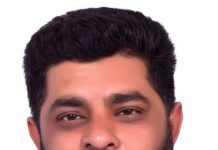
Chandigarh
17 May 2019
DIVYA AZAD

Prof BS Chavan, Director Principal GMCH, during his lecture on ‘Home Based Psychiatric Rehabilitation’ stated that approximately 13 percent of Chandigarh population above 18 years of age is suffering from diagnosable common mental disorders (depression, anxiety disorder, alcohol and substance abuse, OCD, stress related and adjustment disorders) and another 1 percent has severe mental illness (National Mental health Survey 2016).
Dr Chavan further shared that approximately 80 percent persons are not seeking treatment and are home bound. Majority of them ( 50-70 percent) have moderate to severe disability. Under the Mental health Care Act ( 2017), Home Based mental health care and rehabilitation is right of a person who can access services from a hospital. Although there are no model available, but the Dept with assistance from Parivartan NGO is providing crisis (violence due to mental illness, drug overdose, suicidal attempt and gross personal neglect) and home based care for persons who have dropped out, person with mental illness who is unable to come to hospital due to physical disability and homeless and wandering persons.
He was speaking at the Two-day Sixth National Conference of World Association of Psychosocial Rehabilitation (WAPR)- Indian Chapter. The conference was inaugurated by Justice Jitendra Chauhan, Punjab and Haryana High Court in the presence of Prof BS Chavan, Director Principal GMCH, Dr C Ramasubramanian, President of WAPR –IC, Dr Mathew Varghese, Vice President, Dr Nitin Gupta, organizing secretary of the conference.
The conference is being hosted from 17-18th May by Dept of Psychiatry, Govt. Medical College & Hospital The conference is being attended by around 250 delegates comprising of various interdisciplinary professionals including psychiatrists, psychologists, social workers, mental health nurses and trainees working in the field of mental health. The theme of the conference was “Indigenous and Pragmatic Models for Rehabilitation: Focus for the future” . The larger purpose of the conference is to capture the evidence based models of rehabilitation in different part of the country.
Prof Chavan further stated that the role of medicines is limited for negative symptoms of chronic mental illness, where as social skill training, cognitive enhancement therapy (CET) and vocational training and placement are very effective. Psychosocial rehabilitation aims at improving the individuals’ competencies as well as introducing environmental changes to improve individuals’ quality of life and enhance community integration. The Department of Psychiatry, GMCH-32 is working relentlessly in this direction by effectively running the rehabilitation services at Disability Assessment, Rehabilitation & Triage (DART) since December 2012.
The scientific programme of the conference which included various invited lectures, symposiums and workshops etc translated the very mission of the World Association for Psychosocial Rehabilitation: Indian Chapter that strives to pave the way for advocacy for mental-health care, develop policy and create awareness about mental illness. Professor Mohan Issac who is an eminent consultant of Psychiatry and Clinical Neuroscience, Fremantle, Australia talked in the theme symposium on the evolution of the ‘Mental Hospital/ Chronicity Based’ concept of Psychosocial Rehabilitation. Other experts working in rehabilitation added to theme symposium by talking on GHPU Based Services for Rehabilitation, role of NGO’s in sphere of Psychosocial Rehabilitation & Rehabilitation of Homeless Mentally ill persons.
A lecture by C. Ramasubramanian, President, WAPR (Indian Chapter) highlighted the contributory role of Information Technology and Telemedicine in the various models of rehabilitation. Professor B.S. Chavan presented his experience of Model of Home-Based Rehabilitation under MHCA, 2017 in terms of feasibility and barriers. There was a workshop on Community based Rehabilitation for Intellectual Disability. The unique feature of the event is that it is customised to fit the needs of service users, family members of persons with psychiatric illnesses and other stakeholders.
Special invited workshops on needs of caregivers, support and training of caregivers of persons with mental disorders has been planned only for caregivers was highly appreciated. Another workshop was deliberated specially for the service users i.e patients. Approximately 40 patients attended this workshop and expressed their unfulfilled Needs & aspirations during available treatment. Around 55 papers will be presented during this conference. This is first time that patients and their family members are the delegates in the conference.





































